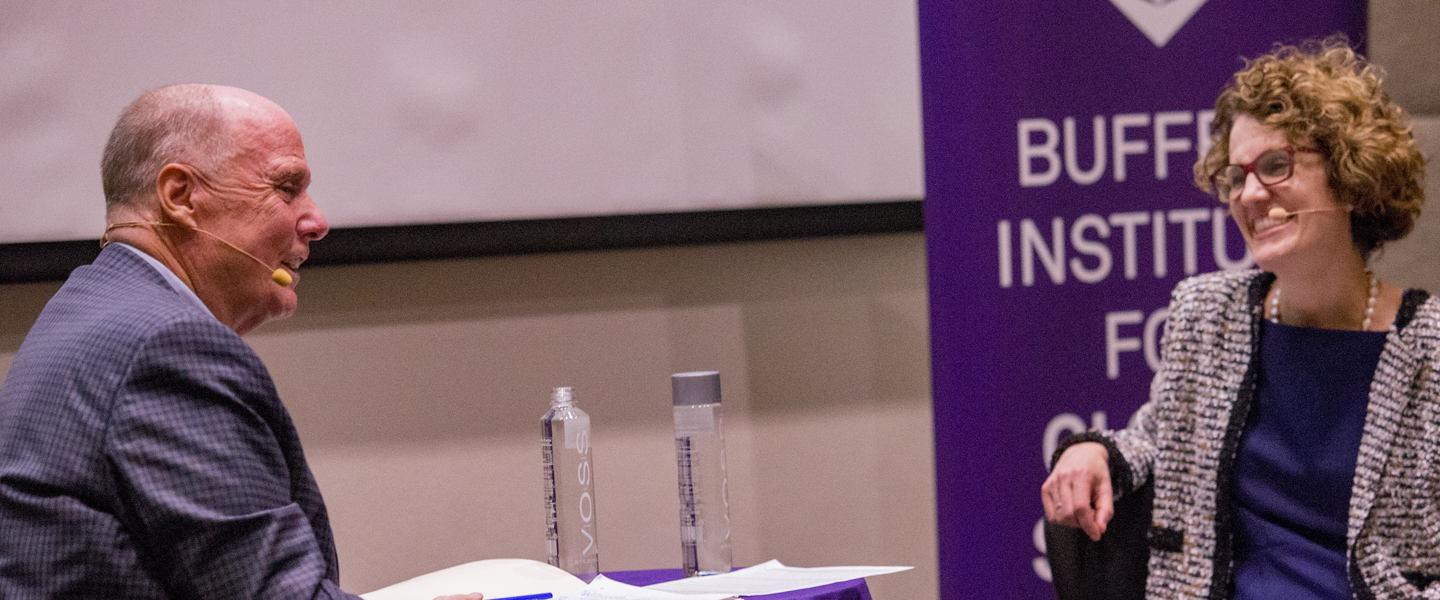Tom Donilon, former national security advisor, on cybersecurity and the "return of geopolitical competition"
There are two nations that have the ability to control the standard of technology for the next 50 years: the US and China....This is more important than tariffs and trade.”
Tom Donilon
Former National Security Advisor Tom Donilon recently sat down with Buffett Institute Executive Director Annelise Riles for a conversation about current and future threats to United States national security.
“Experts like Tom Donilon bring deep knowledge and unique perspective to cutting-edge debates about global affairs,” says Riles. “Through discussions like this one, we foster a two-way conversation between the academy and the world. We learn from the policy community and hopefully share the insights of the scholarly community with policy-makers as well.”
Donilon shared his expertise in international cybersecurity, economics, and energy issues to a crowd of more than 130 Northwestern parents, students, faculty, and staff as part of the Family Weekend events program. In addition to having closely advised three presidents on policy and security, Donilon is also a parent of a first-year undergraduate student at Northwestern.
Donilon spoke about his own career path, which began in 1977 when he worked as a political aide for President Carter. He gave some advice to students looking to forge their own career path in public policy and global leadership:
“From a policymaker perspective, the things that were most important is: read history, and read it all the time, and secondly, write. Do public service at some time in your life. It can be part time, full time, but you won’t remember anything more, you’ll feel good about it, and you’ll do a lot of good for the world.”
Global threats in a changing geopolitical climate
Russia, China, and the changing nature of their respective relationships with the US and the world were major topics of discussion.
“We have seen the return of geopolitical competition. For 25 years, following the Cold War, we had relationships between and among the great powers like China and Russia that were constructive and productive,” he said. “But now, Russia has become actively hostile, and we have entered a much more competitive phase in our relationship with China.”
He also cited a destabilized Middle East and the rise of populism as factors in the changing geopolitical climate, along with the new reality that the United States is a source of uncertainty in the world.
“If it feels unusually unstable today, it’s actually quantifiably the case,” he said, citing a recent report that the number of volatile and unstable situations has been this high only twice since World War II.
Technology, innovation, and cybersecurity
Technology is one of Donilon’s biggest international security and policy concerns.
“There are two nations that have the ability to control the standard of technology for the next 50 years: the US and China. Who’s going to get the command of this technology? This is more important than tariffs and trade. We worry too much about what China’s doing, and the most important thing should be what we, the United States, are doing with our own research and development.”
He also discussed how technology affects military strategy and war: “We have air, land, and sea, and now cyber will be part of every country’s war plan. We are very uneven right now with cybersecurity. The technology is there, but the distribution is uneven – some sectors are behind, in part because it’s so expensive.”
He expressed concerns about the Internet of Things and the need to impose security standards on the billions of household appliances that will be connected to the internet, much like how electrical appliances are inspected and guaranteed that they won’t light on fire.
Climate change as a national security threat
Donilon was asked whether global climate change was a national security threat and whether it was being taken seriously by members of the United States government.
“The people I found in government who were most concerned about climate change were our uniformed officers,” he said. “They are all over the world and are among some of the most strategic thinkers in the US government… And when they look at the threat to our economy, reduced food supply, increased disease, the US military gives the strongest testimony of anybody in the government of the threat of climate change.”
Looking toward a better future
Despite building a career out of predicting and identifying threats, Donilon remains optimistic about the future of the United States.
“The US has tremendous assets: great university systems, a dominant military, innovation, great companies, tremendous geography – we’re the most secure great power in history, we’ve got friendly nations to the North and South, two huge oceans on either side, tremendous natural resources, the ability to feed ourselves, we’re an energy superpower. On the liabilities side, it’s almost all about us: deficits and debt, infrastructure, our education system, immigration system, political system.
“And if you go through that list, absolutely every one of these challenges is conquerable, every single one, and it’s a matter of political will to fix them.”

